
Register with Plumtri!
Register on plumtri as an Individual or as an Organisation to gain access to all of its useful features and remain updated on the latest R&I news, events and funding opportunities.
-
 Welcome to plumtriA platform for Research & Innovation
Welcome to plumtriA platform for Research & Innovation -
 Register today to start receiving our monthly newsletter
Register today to start receiving our monthly newsletter -
 Looking for Funding?Check out the current open calls
Looking for Funding?Check out the current open calls -
 Looking to partner up?Search our list of registered profiles
Looking to partner up?Search our list of registered profiles -
 You have questions on a particular funding programme?
You have questions on a particular funding programme?
Calls for Funding
Filter
Calls
Sustainable Blue Economy Partnership 2024 Transnational Call
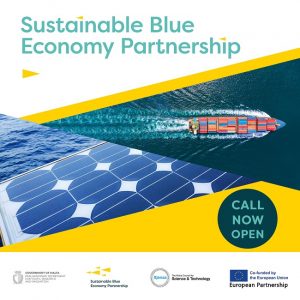
Source of Funding: SBEP - Sustainable Blue Economy Partnership
The Sustainable Blue Economy Partnership is a Horizon Europe co-funded partnership. It constitutes a network of 25 countries and the European Commission that enables an unprecedented effort to pool research and innovation investments and align national programmes at pan-European scale.
MCST, as one of the Research Funding Organisations launched the 2nd Joint Transnational Co-Funded Call and will be financially supporting R&I projects addressing challenges on the following priority areas:
- Digital Twins of the Oceans (DTO) at Regional Sub-basin Scale
- Blue Economy Sectors: Development of Marine Multi-use Infrastructures
- Planning and Managing Sea-uses at the Regional Level
- Blue Bioresources
Entities residing in Malta are eligible for funding, with the option of requesting up to €500,000 to participate in a SBEP proposal consortium*.
For further information on this year’s call, kindly refer to the Call Text, as well as the provisional National Rules for Participation for State Aid and Non-State Aid .
Pre-proposal submission deadline – 10th April 2024, 15:00 CET.
Visit the below link to read further and download the application forms, while the recording of the information session held on 22nd February 2024 here below.
Information and image source:
Interreg VI-A Italia-Malta
Source of Funding: Interreg Malta-Italia
In the Gazzetta Ufficiale della Regione Siciliana no. 1 of 5 January 2024, the extract of the Public Notice 01/2023 for the presentation of cooperation projects under the specific objectives of the INTERREG VI – A Italia-Malta programme, approved by the Managing Authority with DDG no. 1273 of 29/12/2023, was published.
The total ERDF contribution is €27,669,485 divided as follows for each specific objective
Priority 1 – A smarter area of cooperation to promote research and innovation and the development of skills for smart specialisation
- Specific Objective 1.1 – Developing and enhancing research and innovation capacities and the uptake of advanced technologies in the cross-border area (RSO1.1) – € 6.020.880 (ERDF)
• Specific Objective 1.2 – Develop skills for smart specialisation, industrial transition and entrepreneurship in the cross-border area (RSO1.4) – € 3.386.745 (ERDF)
Priority 2 – A resilient cooperation area, which strengthens the protection and preservation of nature also through the efficient use of resources
- Specific Objective 2.1 – Promoting climate change adaptation, disaster risk prevention and resilience in the cross-border area (RSO2.4) – € 5.693.985 (ERDF)
• Specific Objective 2.2 – Promoting the transition to a circular economy in the cross-border area (RSO2.6) – € 2.515.947 (ERDF)
• Specific Objective 2.3 – Enhancing the protection and preservation of nature, biodiversity, green infrastructure and reducing pollution in the cross-border area (RSO2.7) – € 5.031.893 (ERDF)
Priority 3 – An area of efficient cooperation in social capital through the role of culture and sustainable tourism in economic development
- Specific Objective 3.1 – Enhancing the role of culture and sustainable tourism in the cross-border area in economic development, social inclusion and social innovation (RSO4.6) – € 1.976.392 (ERDF)
Priority 4 – An area of cooperation with better governance between Italy and Malta
- Specific Objective 4.1 – Enhance the efficiency and effectiveness of cooperation in the cross-border area (ISO6.4) – € 3.043.643 (ERDF)
The amounts shown above constitute the contribution of the European Union from the European Regional Development Fund (ERDF), equal to 80% of the INTERREG VI-A Italy Malta programme.
For Italian beneficiaries (public and private bodies as well as bodies governed by public law) the national contribution, equal to 20%, is ensured by the national Fondo di Rotazione, without prejudice to the rules on state aid.
For Maltese beneficiaries the national contribution, equal to 20%, is to be ensured from the partner itself.
Deadline: 4 April 2024
Continue reading on the below link.
Information and logo source:
PRIMA Section 2 Call 2024
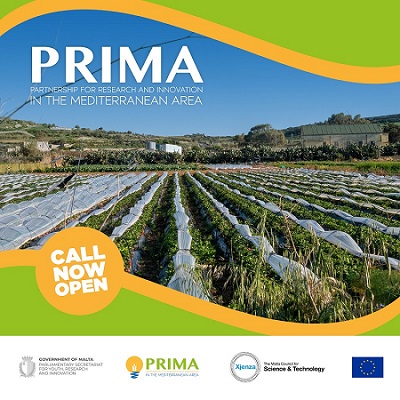
Source of Funding: Malta Council for Science and Technology
PRIMA – Partnership for R&I in the Mediterranean – facilitates collaborative R&I in the areas of Water Management, Farming Systems and Agro-Food Chain. The Water-Energy-Food-Ecosystems (WEFE) Nexus approach is mainstreamed into all its topics under the three thematic areas above.
PRIMA Participating States fund transnational R&I projects addressing the scope and objectives of the PRIMA Section 2 multi-topic call tackling the following topics:
Thematic Area 1: Water Management in the Nexus
- Topic 2.1.1 (RIA) Effective water accounting approaches under crisis conditions: climate change and external shocks
Thematic Area 2: Farming Systems in the Nexus
- Topic 2.2.1 (RIA) Revitalizing agroforestry practices for sustainable land use and climate resilience in the Mediterranean region
Thematic Area 3: Agro-food Value Chain in the Nexus
- Topic 2.3.1 (RIA) Leveraging urban and local food systems for sustainable food systems transformation.
Entities residing in Malta are eligible for funding under the Section 2 calls, with the option of requesting up to € 500,000 to participate in a PRIMA proposal consortium (N.B. if more than one National partner is present in one consortium, the total amount of funding for the participating National partners cannot exceed the € 500,000 capping).
Click on the below link to download guidelines and application forms. The recording of the workshop: PRIMA Collaborate - An Event Uniting MED Researchers in Malta for Innovation (8-9 February 2024) can be viewed here below:
Information and image source:
Africa Initiative II Calls to Strengthen EU-African Cooperation in Research and Innovation
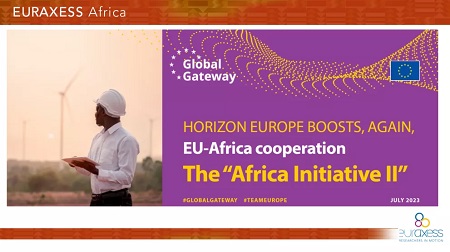
Source of Funding: Horizon Europe
n the 2ndWork Programme of Horizon Europe 2023-2024
- Building on the positiveoutcome of the Africa Initiative I ofHorizon Europe Work Programme 2021-2022.
- A total budget of ~300 MEUR through ~30 topics under calls for proposals to boostEU-Africa cooperation
on Research & Innovation (R&I). - Enabling the implementation of the short-term and medium-term actions of the AU-EU Innovation Agenda, aiming to translate R&I into tangible positive impact on the ground, particularly in the areas of:
- Green Transition (260 MEUR)
- Innovation & Technology (35 MEUR)
- Capacities for Science (9 MEUR)
Call deadlines varies from call to call, please click here to read further.
Information and image source:
CEF Digital Calls for Proposals - Backbone connectivity for Digital Global Gateways - Works & Studies
Source of Funding: European Commission
Supporting the deployment of trans-continental backbone networks, such as submarine cables, to strengthen the quality and resilience of connectivity between EU countries and beyond.
Studies
This topic will support studies for the deployment of backbone connectivity for routes within Member States (including OCTs), between Member States (including OCTs), and between Member States (including OCTs) and third countries which can fit within the scope described in Section 2.1 (CEF-DIG-2023-GATEWAYS-WORKS).
Proposals under this topic shall address studies including the preparatory work required prior to signing a contract with a supplier, such as marine ground surveys for submarine cables and application for required permits.
Click here to read further.
Works
This topic will support the deployment of backbone connectivity for routes within Member States (including OCTs), between Member States (including OCTs), and between Member States (including OCTs) and third countries:
(1) where there is a lack of redundancy on a route. This is typically the case of routes which are not served by at least two present or credibly planned backbone infrastructures; or
(2) where existing or credibly planned backbone infrastructure cannot reliably satisfy the demand, taking into account, the increase in demand linked to ongoing or credibly planned investments in the upgrade of access networks in territories concerned. The utilisation of existing capacity as well as the expected lifetime of existing backbone networks are among the elements that may be taken into account to justify such a market failure and the urgency of intervention; or
(3) where despite the presence of a backbone infrastructure providing sufficient capacity and guaranteeing the necessary redundancy, in the absence of credible plans from alternative operators to enter the market, the users in the served territories suffer (or could suffer in the absence of adequate regulatory remedies) from suboptimal services or prices compared to those offered in more competitive but otherwise comparable areas or routes. This could be the case for instance if the backbone infrastructure or a substantial part of it is in the hands of an operator which according to a competent national regulatory authority has significant market power in the relevant market.
Information and image source:
New Joint Call on Deep-Sea Mining by JPI Oceans
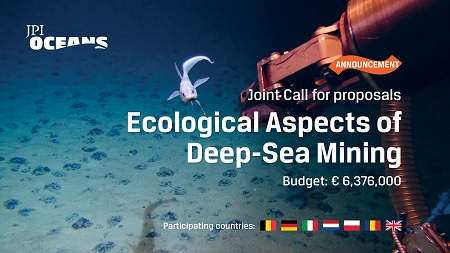
Source of Funding: JPI Oceans
With the support of Belgium, Germany, Italy, the Netherlands, Poland, Romania and the UK, JPI Oceans aims to further advance scientific knowledge in support of policy making on deep-sea mining, while facilitating the analysis of related ethical implications and societal consequences.
The scope of this joint call results from a yearlong process in which scientists, policy makers, industry, and NGO representatives as well as interested JPI Oceans members gathered to take stock of knowledge gaps and future research priorities. Exploring the potential of a successor activity to two previous phases of the JPI Oceans Joint Action on the ecological aspects of deep-sea mining, experts, policy makers, and interested JPI Oceans members gathered first in a scoping meeting on 11 October 2022. Several aspects of deep-sea mining impact were identified that require further or more detailed investigation. Following up, a meeting was set up with the ISA secretariat to identify the information needs from a policy perspective. This step was complemented by a stakeholder consultation workshop in which representatives from NGOs and industry were consulted to give their perspective on a third phase of the Joint Action.
As a result of these meetings and a brief review of recently published studies, the following issues have been identified as important scientific objectives in a successor phase:
Ecosystem dynamics
- Analyse the ecosystem functioning and food web architecture in the deep sea;
- Understand and assess ecosystem resilience;
- Understand the natural spatial and temporal trends and variability in the deep sea on a regional scale;
- Accounting of biodiversity and ecosystem goods and services in the deep sea.
Ecological impacts of polymetallic nodule mining
- Underpin the scientific evidence to establish threshold values that define serious harm and to develop indicators of ecosystem health;
- Investigate effectiveness of mitigation and potential restoration measures;
- Study longer-term and cumulative impacts on polymetallic nodule habitats by prototype collector trials;
- Develop a deep-sea digital twin and modelling approaches to enable a better predictive capacity and trade off analysis;
- Make a comparative analysis of terrestrial and deep-sea mining in terms of their socio-ecological footprints, forming a foundation for further societal discourse.
Ecological impacts of massive sulphide mining
- Characterise polymetallic sulphide-based ecosystems at inactive vent sites;
- Investigate abiotic parameters at hydrothermally inactive sites of massive sulphide deposits and neighbouring deep-sea habitats;
- Study the ecological impact of potential massive sulphide mining tests including the identification of test-sites;
Science-based support to governance
- Make a preliminary analysis of proposed governance and management regimes;
- Inform the definition and development of improved standards and guidelines for environmental baselines, monitoring, and impact assessment;
- Establish adaptive management tools and criteria for minimizing harmful impacts;
- Analyse ethical implications and societal consequences related to deep-sea mining.
While the previously funded MiningImpact II project studied ecological impacts of a pre-prototype polymetallic nodule collector vehicle (Patania II) exploitation test, in a follow-up phase fieldwork in one of the funded projects could be linked to a full-scale mining test which includes a riser system. Monitoring of the industrial equipment test should particularly aim at reducing the existing uncertainties with respect to the discharged sediment plume and its short- to long-distance impacts on the pelagic ecosystem through released substances, suspended particle concentrations, and eventually deposited blankets of displaced sediment.
In general projects are encouraged to inform the ongoing work of the International Seabed Authority and its members and consider opportunities to align their activities with the strategic research priorities of the ISA Action Plan for Marine Scientific Research.
Continue reading on the below link.
Information and image source:
Creative Europe Desk Calls
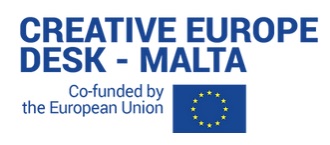
Source of Funding: European Commission
Culture Moves Europe Call Document Culture Moves Europe- Second Call for Residency Hosts Call document European Cooperation Projects Call document European Networks of Cultural and Creative Organisations Call document European Platforms for the Promotion of Emerging Artists Pan Call document TV and online content media Call document Innovative Tools and Business Model Call document Video Games and Immersive Content Development Call document European slate development media Call document European VOD Networks and Operators Call document Films on the move Call document Networks of European Festivals Call document Journalism Partnerships- Collaborations Call document Journalism Partnerships- Pluralism Call document Media Literacy Call document Creative Innovation lab Call document Application deadlines differ from call to call, please access the respective call link to read further or the below link.Each year a number of calls are issued under the media, culture and cross sectoral strand. All calls are issue on the portal https://culture.ec.europa.eu/. Below one can find the list of calls divided according to the relevant strands.
Culture Strand
Media Strand
Cross Sectoral
Information and logo source:
StandICT.eu 2026 - 3rd Open Call
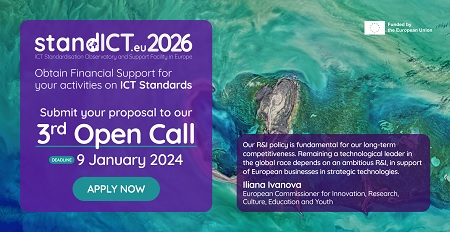
Source of Funding: StandICT.eu
StandICT.eu will provide € 2,925,000 of crucial funding to support the participation of European standardisation specialists in key international and global SDOs. Through nine open calls this funding will enable the specialists to contribute to and help create a fully integrated European Standardisation Ecosystem, thereby strengthening Europe's position in global standardisation initiatives.
The topics and priorities for the series of StandICT.eu 2026 calls which will run from May 2023 until April 2025 are defined through continuous monitoring and careful analysis of the international ICT standards landscape with the involvement of Standards Development Organisations (SDOs) and National Standards Bodies (NSBs), key EC advisory groups including the High-Level Forum on European Standardisation (HLF) and the EU Multi-Stakeholder Platform for ICT Standardisation (MSP), and respected bodies such as StandICT.eu’s Expert Advisory Group (EAG) and Forum for European Strategy on ICT Standards (FOREST).
CALL DEADLINE: 9th January 2024, 17:00 CET
Visit the below link to read further.
Information and image source:
Restore4Life Call for Associated Regions

Source of Funding: Restore4Life
Restore4Life project are looking for at least 5 Associated Regions1 that we can provide with technical assistance to use the outcomes and knowledge of Restore4Life to prepare roadmaps, plans, and projects to restore wetland ecosystems in their region.
The aim is to share the results and knowledge of the project on an ongoing basis with the selected ‘associated regions’ and to provide them with scientific and technical support for the implementation of wetland restoration solutions in their territory. This will involve the twinning of each Associated Region with a similar demonstration site and the provision of technical advisory services necessary to prepare roadmaps, plans and projects to restore ecosystems in the associated regions addressing possible barriers and showing the feasibility of implementing innovative solutions.
To achieve this, we will implement special formats, interactive workshops and a platform for twinning activities to continuously share Restore4Life outcomes and knowledge. All developed tools and restoration measures will be fully open, usable, and made applicable to the Associated Regions.
By joining us as an Associated Region, you will have the opportunity to access our expertise, knowledge, and tools to develop your own roadmap, plan, or project to restore wetland ecosystems in your region.
Eligibility Coutnries:
Funding Activities:
The grant each associated region can apply for is up to € 100,000.
List of type of activities that can receive financial: support:
- Removal of channel and bank regulations for restoration of pristine conditions, biodiversity, and flood protection
- Restoration of natural riverbed and meanders in canalised section of the river
- Removal of invasive tree species from bogs
- Restoration of riparian areas and biodiversity
- Restoring/improving water circulation and connectivity of secondary channels and lakes at low water levels
- Monitoring of existing / previous actions
- Nature based solutions in rivers and floodplains
- River dynamics improvement
- Citizen involvement
This call will open on 1 February 2024 and application deadline is scheduled for 29 May 2024. Visit the below link for further information.
An Information session will be held on 15 December 2023.
Information and image source:
X2.0 Smart Cities & Sustainability
Source of Funding: X2.0 Driving Deeptech Growth Project - EU Funded
X2.0 cohort 4 focuses on Smart Cities and Sustainability domains and seeks innovative and impact-driven deeptech startups! This time around we are looking for teams that aim to leverage the latest technology or scientific discoveries to enhance the quality of life for residents and urban environments all the while promoting sustainable practices and way of life.
This cohort focus encompasses a wide range of sub-topics and areas of focus which can be seen to overlap and interconnect like: urban mobility & clean transportation, urban planning and development, public safety and securiX2.0 cohort 4 focuses on Smart Cities and Sustainability domains and seeks innovative and impact-driven deeptech startups! This time around we are looking for teams that aim to leverage the latest technology or scientific discoveries to enhance the quality of life for residents and urban environments all the while promoting sustainable practices and way of life.
This cohort focus encompasses a wide range of sub-topics and areas of focus which can be seen to overlap and interconnect like: urban mobility & clean transportation, urban planning and development, public safety and security, energy efficiency, circular economy, resource efficiency, water and air quality, waste management, climate change mitigation, environmental monitoring, resilience and disaster preparedness.ty, energy efficiency, circular economy, resource efficiency, water and air quality, waste management, climate change mitigation, environmental monitoring, resilience and disaster preparedness.
Why to participate / Benefits
Innovation Vouchers to cover
- Needs-based growth and scaling services in the max. amount of €20,000
- 1-on-1 mentorship with experts from the field of need in the min. amount of €5,000
- Access large-scale startup and investor-oriented events, exhibitions, and fairs in the amount of €5,000
Other Program Benefits
- Corporate Matchmaking and procurement
- Private Fundraising assistance
- Custom EU funding and public procurement ecosystem and overview
- Talent Matchmaking & Job promotion
- Promotion & Visibility
Continue reading further on the below link.
